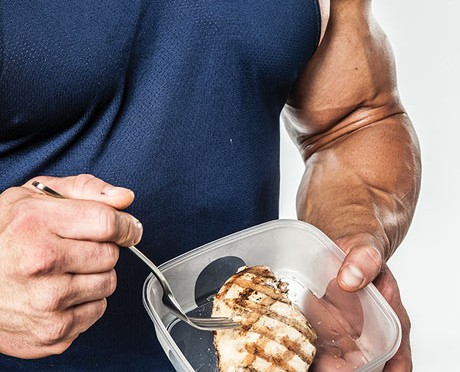
[ad_1]
Mass gain is a key step in the practice of bodybuilding! That said, it is imperative to prepare it well. Mass gain involves weight gain that necessarily requires an adapted diet and a specific training program with one and only goal: to gain body weight and especially muscle mass! Mass gain also aims to develop strength to become more massive, that is to say to gain muscle thickness and volume! Appropriate nutrition and an effective program will help you achieve mass gain! We will therefore see in this first article some diet rules and then in a second we will discuss the main lines for a weight gain program!

Nutrition program for mass gain
In period of weight gain, you have to consume as many calories as possible throughout the day! The diet must be adapted according to the objective to be reached! Indeed, initially, it will be necessary to increase the number of meals and snacks per day! It will take between 5 and 6 meals / day! You will also have to think about spacing out your meals: either a meal / snack every 3/4 hours. The diet for mass gain : it is also to calculate its ratio in macro-food. So the ideal regimen for gaining weight would be 56% carbohydrate, 28% protein, and 16% fat. As you will have understood, weight gain, through the nutrition to be adapted, will take time and organization. Therefore, it will be essential to shop regularly in order to prepare meals in advance.

Nutrition: The basic principles to know for mass gain!
In order to obtain good results, it is necessary to know some fundamental rules in order to maintain a constant blood sugar level and to favor carbohydrates with a low glycemic index (such as those contained in fruits and vegetables….). It is also necessary to consume elements rich in proteins and this with each meal! As it is not always easy to eat meat, you can eat protein powder or amino acids in tablets! Finally, we must consume good fats like those contained in fish. Avoid saturated fat as much as possible. Favor cooking on the grill (without fat), steam… Another important point: hydration! Drink at least between 2 and 2.5 liters of water per day.
Monitor your calorie intake, knowing that for a mass gain, you will have to ingest 3600 Kcal! For info: 1g of carbohydrates is equivalent to 4 kcal; 1g of protein corresponds to 4 kcal and 1g of fat represents 9 kcal!

The diet for optimal mass gain!
Weight gain means increase lean mass, but not only ! Therefore, it is imperative that the number of daily calories is greater than that of calories burned! That said, mass gain in principle concerns those who have trouble gaining weight (for others it will be more a diet aimed at gaining volume). It will be necessary to consume a significant amount of carbohydrates (rice, pasta, cereals among others and also gainers), in short all the elements that will stimulate mass gain! Protein intake will also have to be adapted in order to be able to nourish the muscles. A poor protein intake will be synonymous with poor mass gain! Important point, during a weight gain, we can consume foods rich in lipids, without overdoing it!
Since each individual reacts differently depending on his metabolism, it is also advisable to adapt his diet according to his temperament!
Nutrition program for mass gain according to Fitadium !
Keeping in mind that for a mass gain, you will have to eat a lot of calories every day. It will therefore be essential to distribute the portions evenly throughout the day! Here is an example suitable for non-professionals!
We start on the principle that we take 6 meals during the day:
- Eating breakfast at 7 a.m .: Consume around 800Kcal
- Morning snack around 10am: Consume around 300Kcal
- Lunch around 12:30 pm / 1:00 pm: Consume around 800Kcal
- Afternoon snack around 4 p.m .: Around 300Kcal
- Dinner taken around 7:00 p.m .: Consume around 800Kcal
- Evening snack to be taken around 10 p.m. see 10:30 p.m. maximum: Consume around 300Kcal

Similar articles
[ad_2]